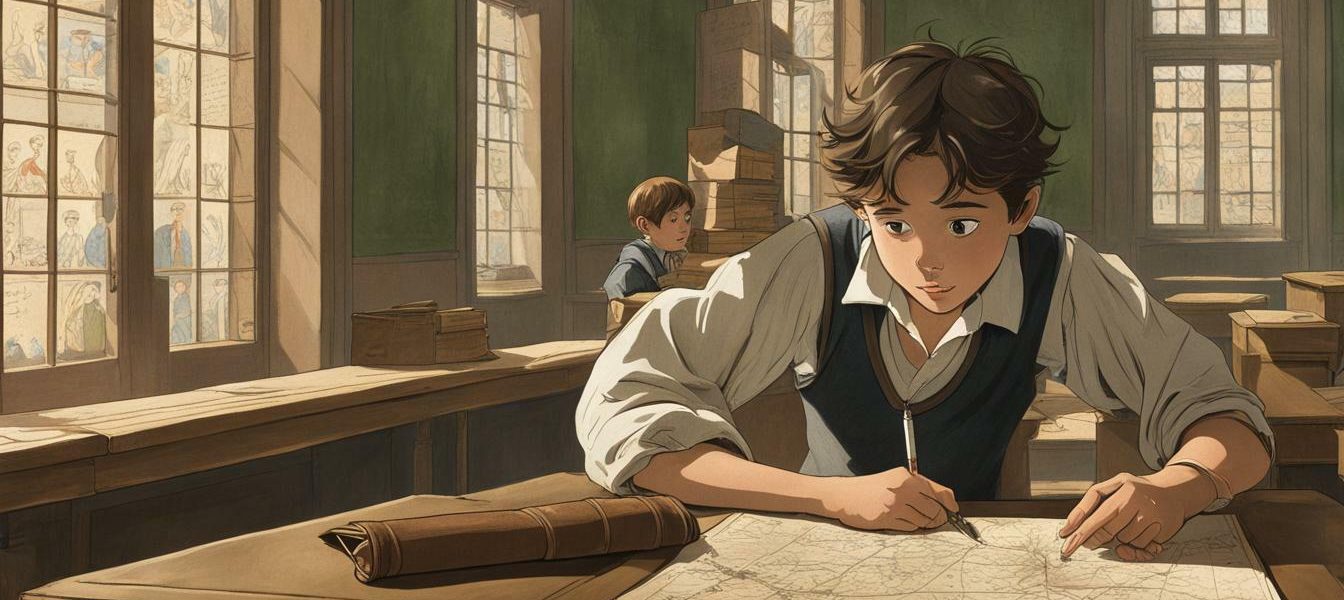
Where Did Shakespeare Go To School
William Shakespeare, one of the greatest playwrights in English literature, is renowned for his poetic language and compelling stories. But where did Shakespeare receive his education? Understanding his educational path is key to unlocking the origins of his literary genius. In this section, we will delve into Shakespeare’s schooling and explore the influences that shaped his academic journey.
Key Takeaways
- Shakespeare’s educational journey had a significant impact on his literary legacy.
- Stratford Grammar School played a crucial role in shaping Shakespeare’s scholarly beginnings.
- Shakespeare’s involvement in extracurricular activities, particularly in theater, played a significant role in his education.
Early Life and Background
Before we delve into Shakespeare’s schooling, it’s important to understand his early life and background. William Shakespeare was born in Stratford-upon-Avon in England. His father, John Shakespeare, was a successful local businessman and his mother, Mary Arden, was a member of a wealthy family.
Shakespeare grew up in a bustling household with seven siblings. His education began at an early age at the local grammar school, where he learned to read and write. He was also exposed to Latin, which would become a crucial element in his literary career.
Shakespeare’s upbringing in a prosperous family and education at the Stratford Grammar School likely provided him with many opportunities to explore his literary interests and develop his writing skills.
Early Influences
“All the world’s a stage, and all the men and women merely players. They have their exits and their entrances; And one man in his time plays many parts.”
Shakespeare’s early life experiences and family context played a significant role in shaping his writing. His father’s occupation as a glove-maker and local official may have exposed him to various legal and social issues, which he explored in his plays. Additionally, his involvement in the local theater scene likely inspired his love for drama and playwriting.
Despite growing up in a town, Shakespeare’s work often explores rural and natural settings. This dichotomy between urban and rural themes may have been influenced by both his upbringing and the literary trends of his time.
Education at Home
While Shakespeare’s formal education likely ended after his time at Stratford Grammar School, he continued to learn and educate himself throughout his life. He was an avid reader, drawing inspiration from various literary sources, including the works of Ovid, Chaucer, and Plutarch. Additionally, Shakespeare may have received tutelage in the classics and literature from his mother, who came from a family of wealthy landowners with a strong interest in education and culture.
Overall, Shakespeare’s early life experiences and family context undoubtedly played a significant role in shaping his literary career. His education at home and at school provided him with a solid foundation in language and literature that enabled him to become one of the most significant playwrights in history.
Stratford Grammar School
William Shakespeare’s alma mater, Stratford Grammar School, was founded in 1553 in Stratford-upon-Avon. The school was established during the reign of Edward VI as part of a broader movement to promote the study of the classics in England. The school was located next to the Holy Trinity Church, where Shakespeare’s baptism and burial took place.
The school was an all-boys institution, and students began attending at the age of seven. Although it was a public school, Stratford Grammar School was not free, and fees had to be paid for each student’s education. The fees would have been a burden for Shakespeare’s family, who were not wealthy, but the young Shakespeare was able to attend thanks to a scholarship.
| Curriculum | Teachers |
|---|---|
| The curriculum at Stratford Grammar School was based on the classics, and students received instruction in Latin and Greek. They studied grammar, logic, rhetoric, arithmetic, geometry, astronomy, and music. The curriculum was designed to prepare students for university and for a career in the church or law. | Shakespeare’s teachers included Simon Hunt, Thomas Hunt, and John Cottom. Little is known about these men, but they were likely trained at Oxford or Cambridge and were well-educated in the classics. |
Despite the fact that the school focused on classical education, it also emphasized the importance of moral and religious education. The school’s motto was “Manners makyth man,” which translates to “Manners make the man.” This motto suggests that the school aimed to produce not only well-educated scholars but also young men with good manners and morals.
Shakespeare attended the school until he was 14 years old. His education at Stratford Grammar School undoubtedly had a significant impact on his literary career, as it provided him with a solid foundation in the classics and the English language.
Curriculum and Subjects
Shakespeare’s education at Stratford Grammar School was focused on a classical curriculum with emphasis on Latin studies. Latin was the foundation for all learning during his time, and it was the language of the church and legal professions. Furthermore, his education involved a variety of subjects that prepared him for further academic pursuits and life.
In addition to his Latin instruction, Shakespeare would have studied other languages such as Greek, Hebrew, and French, as well as mathematics, astronomy, and music. These subjects were seen as important aspects of a well-rounded education.
Aside from these subjects, Shakespeare would have received a thorough grounding in literature, from the classics to contemporary authors. The study of rhetoric was also significant, as it helped him to craft his skills in persuasive and powerful wordplay.
Literature and Language
Studying literature and language was an integral part of Shakespeare’s education. His exposure to the works of classical authors such as Cicero, Ovid, and Horace, as well as English authors like Chaucer, helped to shape his writing style and themes.
In terms of language, Shakespeare’s education enabled him to develop a mastery of the English language, leading to the creation of some of the most iconic phrases and expressions in literary history. His studies in Latin and other languages also contributed to his ability to draw on a wide range of vocabulary and writing techniques in his plays and poems.
Relevance to his later works
Many of the subjects studied by Shakespeare at Stratford Grammar School had a direct impact on his writing and the themes he explored. The influence of classical literature can be seen in his plays’ historical and mythological allusions, while his knowledge of rhetoric is evident in his use of persuasive language to build tension and drama.
Furthermore, his education helped him to develop a deep understanding of the human condition and inspired him to explore universal themes such as love, power, and ambition in his works.
In conclusion, Shakespeare’s education at Stratford Grammar School was a crucial foundation for his later literary achievements. His studies in classical literature, languages, and rhetoric provided him with the skills and knowledge necessary to become one of the greatest writers of all time.
Teachers and Influences
Shakespeare’s education was not solely defined by his time at Stratford Grammar School. The educators who influenced him played a significant role in shaping his academic journey.
Mr. Thomas Hunt
One of Shakespeare’s early teachers was Mr. Thomas Hunt. Hunt was known for his strict teaching methods, a fact that may have influenced Shakespeare’s later portrayal of characters such as Polonius in Hamlet.
Hunt’s emphasis on rhetoric and public speaking also had a lasting impact on Shakespeare’s writing. His characters often deliver speeches and monologues that showcase their rhetorical skills, a nod to the influence of his former teacher.
John Cottom
Another significant influence on Shakespeare was his teacher, John Cottom. Cottom was a master of Latin, a subject that Shakespeare excelled in.
Under Cottom’s guidance, Shakespeare became proficient in Latin and was able to use this skill to incorporate classical references and allusions into his plays.
Christopher Marlowe
Although not a teacher in the traditional sense, Christopher Marlowe had a profound impact on Shakespeare’s writing. Marlowe was a fellow playwright and poet, and his works heavily influenced Shakespeare’s early plays.
Marlowe’s use of blank verse and his exploration of complex themes such as politics and power had a significant impact on Shakespeare’s writing style and subject matter.
Extracurricular Activities and Theater
While attending Stratford Grammar School, Shakespeare was exposed to the theater scene thriving in Stratford-upon-Avon. The town was home to traveling troupes of actors who performed at local taverns and inns. These performances were often bawdy and raucous, attracting all manner of crowds.
As a young man, Shakespeare is believed to have been a member of a local theater company before moving to London to pursue a career in the theater. His time in the theater scene at Stratford-upon-Avon likely gave him invaluable experience as an actor and as a playwright.
Furthermore, Shakespeare’s involvement in theater allowed him to explore different themes and explore the human condition beyond what was taught in the classroom. The experiences he had during this time are believed to have influenced his later works.
Shakespeare’s time in the theater was not just a hobby, but a serious pursuit. It was through his work as an actor and playwright that he gained recognition and established himself as one of the most prominent literary figures of his time.
Shakespeare’s Works and the Theater
Shakespeare’s plays are renowned for their dramatic language and vivid characters. His works explored themes such as love, tragedy, and comedy, and are still relevant today. Much of his success is attributed to his ability to create engaging and relatable characters, often portraying elements of the human experience in a profound and thought-provoking manner.
Though the theater scene was not as refined in Shakespeare’s time as it is today, it provided him with a platform to showcase his work and hone his craft. The plays he wrote for the theater were meant to be performed, and he was careful to craft his language and characters in a way that would capture the attention of audiences.
“All the world’s a stage, And all the men and women merely players; They have their exits and their entrances; And one man in his time plays many parts.” – William Shakespeare
Throughout his career, Shakespeare placed a great deal of emphasis on the importance of performance in bringing his work to life. The theater was not simply a place for entertainment, but a space for artistic expression and exploration.
Shakespeare’s time in the theater greatly influenced his approach to writing, character development, and even language itself. He not only wrote for the stage, but also helped shape the theater scene of his time.
Higher Education and University
Despite widespread speculation, there is no concrete evidence that William Shakespeare pursued higher education after completing his studies at Stratford Grammar School. While it is possible that he attended university, it is also possible that he chose to focus on his family’s financial needs and his burgeoning career in the theater.
Many scholars have debated the potential impact of higher education on Shakespeare’s literary career. Some argue that a university education would have provided him with a more sophisticated understanding of language and literature, while others believe that his lack of formal higher education allowed him to break free from traditional academic structures and forge his own unique voice.
Regardless of whether or not he attended university, it is clear that Shakespeare’s education, both in and out of the classroom, laid the foundation for his incredible literary achievements.
Life Lessons and Self-Education
Despite the absence of a formal university education, Shakespeare’s life experiences and self-education were crucial to his development as a playwright. He was deeply influenced by his early life in Stratford-upon-Avon and the theater scene in London, where he began his career as an actor and writer.
One of Shakespeare’s greatest life lessons came from his experience with social class. Born into a family of modest means, he witnessed the struggles of the lower class in his youth. This experience imbued his writing with a unique perspective on class and social conflict.
Shakespeare was also a voracious reader, constantly seeking out new ideas and literary forms. His works reflect a deep understanding of classical literature and the human experience, demonstrating the value of self-education and lifelong learning.
Furthermore, Shakespeare’s travels and exposure to different cultures influenced his writing style and themes. He drew from a variety of sources, including history, mythology, and folklore, to create some of the most enduring works of English literature.
“All the world’s a stage, and all the men and women merely players.” – William Shakespeare
Indeed, Shakespeare’s life journey and self-education are a testament to the power of determination, creativity, and lifelong learning. His works continue to inspire new generations of scholars and writers, encouraging us to explore the world around us and embrace the boundless possibilities of human experience.
Legacy and Influence
Shakespeare’s education at Stratford Grammar School played a crucial role in shaping his literary legacy. His extensive knowledge of literature, history, and classical languages seeped into his writing and made his plays both entertaining and educational.
Shakespeare’s unique approach to language and literature continues to influence writers and scholars from all corners of the globe. His works have been translated into every major language, inspiring countless adaptations, films, and television shows.
The Impact of Shakespeare’s Education on His Plays
Shakespeare’s education had a profound impact on his plays. His vast understanding of literature and classical languages enabled him to incorporate complex themes into his works, making them both entertaining and thought-provoking.
His education also shaped the language and structure of his plays. His use of iambic pentameter, a form of verse consisting of ten syllables per line, revolutionized English poetry and became a hallmark of his writing.
The Lessons We Can Learn from Shakespeare’s Scholarly Beginnings
Shakespeare’s education was not limited to the classroom. His life experiences and self-education played a significant role in his development as a playwright.
His passion for theater and his involvement in extracurricular activities taught him the importance of collaboration, hard work, and persistence. His success as a writer reminds us that academic credentials are not the only path to success, and that a willingness to learn, grow, and adapt can lead to remarkable achievements.
Shakespeare’s educational journey serves as a reminder of the importance of education, both formal and informal. It encourages us to explore our passions, expand our knowledge, and embrace learning as a lifelong pursuit.



